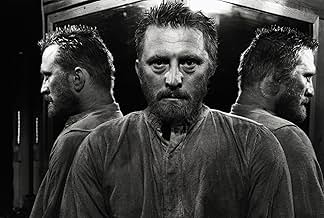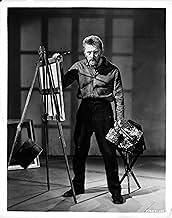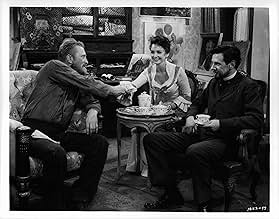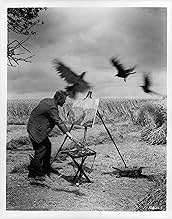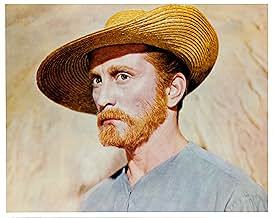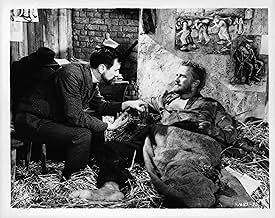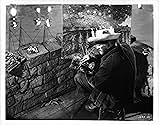The life of brilliant but tortured artist Vincent van Gogh.The life of brilliant but tortured artist Vincent van Gogh.The life of brilliant but tortured artist Vincent van Gogh.
- Directors
- Writers
- Stars
- Won 1 Oscar
- 4 wins & 6 nominations total
- Directors
- Writers
- All cast & crew
- Production, box office & more at IMDbPro
Featured reviews
When I hear the name Vincente Minnelli certain scenes pop up on my inner screeningroom: A tracking shot at the fair (Some came running), the low tracking zoom towards Douglas and Turner at the pool (Bad and the Beautiful), snowmen (Meet me in St Louis) and the agony in Douglas's face in "Lust for life"; in fact as soon as his redbearded agonized face pops up, all the other movies fade away and "Lust for life" takes over my inner screening room.
But apart from being my favorite Minnelli movie, its a movie that more than any other shows his genius in use of colors; every scene is composed in breathtaking technicolor with the deepest respect for Van Gogh's own use of color, and Douglas's acting is filled with the same agony and passion as the strokes of Van Gogh's brush. As the other great movies who uses color to its fullest (Wizard of Oz, Black Narcissus, Ten Commandments), the simularities between the director and the painter is obvious. Hence, Minnelli's struggle for "painting" the scenes with the richness of technicolor becomes an echo of Van Gogh. It also reads as a textbook in composition from Steinberg's Dead Space to Eisenstein's juxtapositions. In all, Minnelli is of great skill and uses it to the fullest.
The story, which focuses on the struggle for a new way of expression, is tame at times and the acting (apart from Douglas) seems static most of the times, but the tortured face and body of Douglas and the use of color makes this one of the greatest achievements in MGM's history and one of the best movies Minnelli ever made.
But apart from being my favorite Minnelli movie, its a movie that more than any other shows his genius in use of colors; every scene is composed in breathtaking technicolor with the deepest respect for Van Gogh's own use of color, and Douglas's acting is filled with the same agony and passion as the strokes of Van Gogh's brush. As the other great movies who uses color to its fullest (Wizard of Oz, Black Narcissus, Ten Commandments), the simularities between the director and the painter is obvious. Hence, Minnelli's struggle for "painting" the scenes with the richness of technicolor becomes an echo of Van Gogh. It also reads as a textbook in composition from Steinberg's Dead Space to Eisenstein's juxtapositions. In all, Minnelli is of great skill and uses it to the fullest.
The story, which focuses on the struggle for a new way of expression, is tame at times and the acting (apart from Douglas) seems static most of the times, but the tortured face and body of Douglas and the use of color makes this one of the greatest achievements in MGM's history and one of the best movies Minnelli ever made.
Kirk Douglas is Vincent Van Gogh in "Lust for Life," directed by Vincent Minnelli and also starring Anthony Quinn as Gaugin (Oscar winner for his performance), and James Donal as Van Gogh's brother Theo.
This film is actually based on the Irving Stone novel and while it leaves out parts of Van Gogh's life, it does seem to hit the high points. A sensitive man with a spiritual sense of life, Van Gogh seeks from the beginning to express God in some way and to give something to the world. He is unsuccessful as a minister and eventually takes up painting, supported by his loving brother Theo. Basically he lives somewhere until whomever he's living with gets sick of him and throws him out. He is a terribly lonely man, but he has an intensity that is almost frightening to people. At one point, he takes up with a sometime prostitute with a baby - she eventually leaves. In actual fact, when Van Gogh met this woman, named Sien, she was pregnant with a second child, who grew up believing Van Gogh was his father. Sien some 20+ years later commits suicide.
Van Gogh establishes a friendship with Gaugin and has dreams of an artist colony, but his relationship with Gaugin, as with everyone but his brother, ends terribly when he stalks Gaugin with an open straight razor, later cutting off part of his own ear. It is evident from the film that whatever Van Gogh's mental problem was (and there are many theories, from bipolar, to epilepsy, to schizophrenia), it worsened as time went on, as did his physical condition. He would often buy paints rather than eat and would work ceaselessly.
Van Gogh only sold one painting in his lifetime - however, what the film does not show is that, had he chosen to live, he was on the brink of being recognized for his work. His paintings had started being exhibited and appreciated and began to sell shortly after his death. What also isn't in the film is that his brother died shortly after Van Gogh did. It was Theo's widow who carried on the work that would be involved with Van Gogh's vast collection.
The film reduced me to tears - indeed, the song that says "they should have told you, Vincent, the world was never meant for one as beautiful as you" was certainly true. The only person who ever "got" Vincent was his brother.
As for the performances, Kirk Douglas makes a brilliant Van Gogh. Michael Douglas once said his father isn't considered a great actor because the style back then in the types of roles he played has changed. It's true - seen today, Douglas' work seems too intense at times, too big, too over the top in these times of acting so naturally as to almost be boring. However, I believe that Van Gogh must have been like the Douglas characterization. He obviously drove people away in large masses, and Douglas captured that passion, drive, and overeagerness perfectly. As Theo, James Donal is perfect as the calm one in the family. Anthony Quinn has a short but memorable role as the flamboyant Gaugin. He's wonderful - arrogant, opinionated, temperamental, with a bad temper, and Quinn plays him as an artist without the soul of Van Gogh. But who, after all, had the soul of Van Gogh? Vincent Minnelli lovingly directed this film and it definitely has his wonderful attention to detail, flow, and artistic touch. And the paintings are breathtaking. A beautiful film that will stay with you for a long time, and you'll never see "Starry Night" in the same way again.
This film is actually based on the Irving Stone novel and while it leaves out parts of Van Gogh's life, it does seem to hit the high points. A sensitive man with a spiritual sense of life, Van Gogh seeks from the beginning to express God in some way and to give something to the world. He is unsuccessful as a minister and eventually takes up painting, supported by his loving brother Theo. Basically he lives somewhere until whomever he's living with gets sick of him and throws him out. He is a terribly lonely man, but he has an intensity that is almost frightening to people. At one point, he takes up with a sometime prostitute with a baby - she eventually leaves. In actual fact, when Van Gogh met this woman, named Sien, she was pregnant with a second child, who grew up believing Van Gogh was his father. Sien some 20+ years later commits suicide.
Van Gogh establishes a friendship with Gaugin and has dreams of an artist colony, but his relationship with Gaugin, as with everyone but his brother, ends terribly when he stalks Gaugin with an open straight razor, later cutting off part of his own ear. It is evident from the film that whatever Van Gogh's mental problem was (and there are many theories, from bipolar, to epilepsy, to schizophrenia), it worsened as time went on, as did his physical condition. He would often buy paints rather than eat and would work ceaselessly.
Van Gogh only sold one painting in his lifetime - however, what the film does not show is that, had he chosen to live, he was on the brink of being recognized for his work. His paintings had started being exhibited and appreciated and began to sell shortly after his death. What also isn't in the film is that his brother died shortly after Van Gogh did. It was Theo's widow who carried on the work that would be involved with Van Gogh's vast collection.
The film reduced me to tears - indeed, the song that says "they should have told you, Vincent, the world was never meant for one as beautiful as you" was certainly true. The only person who ever "got" Vincent was his brother.
As for the performances, Kirk Douglas makes a brilliant Van Gogh. Michael Douglas once said his father isn't considered a great actor because the style back then in the types of roles he played has changed. It's true - seen today, Douglas' work seems too intense at times, too big, too over the top in these times of acting so naturally as to almost be boring. However, I believe that Van Gogh must have been like the Douglas characterization. He obviously drove people away in large masses, and Douglas captured that passion, drive, and overeagerness perfectly. As Theo, James Donal is perfect as the calm one in the family. Anthony Quinn has a short but memorable role as the flamboyant Gaugin. He's wonderful - arrogant, opinionated, temperamental, with a bad temper, and Quinn plays him as an artist without the soul of Van Gogh. But who, after all, had the soul of Van Gogh? Vincent Minnelli lovingly directed this film and it definitely has his wonderful attention to detail, flow, and artistic touch. And the paintings are breathtaking. A beautiful film that will stay with you for a long time, and you'll never see "Starry Night" in the same way again.
Not only does KIRK DOUGLAS bear a remarkable resemblance to the real Vincent Van Gogh, but he gives a deeply felt, bigger than life performance in the role of a lifetime, fully deserving his Academy Award nomination.
The letterbox version on TCM doesn't do justice to the film's brilliant color photography, deliberately muted for the early coal mining scenes but crisp and clear when it comes to Van Gogh's now famous paintings. I haven't seen the DVD version, but I hope it's considerably better than the print showing on cable.
At any rate, it's tremendously well done--the entire look of the production creating the sense of time and authentic atmosphere and actually filmed on the actual location sites with an impressive cast of villagers and supporting actors. PAMELA BROWN, NIALL MacGINNIS (as The Postman), and most of all, JAMES DONALD as brother Theo, who nurtures his brother and supports him financially but is unable to sell any of his paintings--except one.
It's a fine recreation of the Irving Stone novel and Douglas immerses himself in the character of Van Gogh, much the way ANTHONY QUINN does as Gauguin. Quinn's stormy, tempestuous relationship with Douglas provides some electric moments of conflict.
The score by Miklos Rozsa accents the drama at every turn, slashing at the drama the way Van Gogh slashed at his canvas with thick brush strokes. It's starkly dramatic without ever being overbearing.
Vincent Minnelli's direction is above reproach. A finer tribute to the tormented artist could not be imagined with so many of his canvases shown on screen in impressive close-ups.
The letterbox version on TCM doesn't do justice to the film's brilliant color photography, deliberately muted for the early coal mining scenes but crisp and clear when it comes to Van Gogh's now famous paintings. I haven't seen the DVD version, but I hope it's considerably better than the print showing on cable.
At any rate, it's tremendously well done--the entire look of the production creating the sense of time and authentic atmosphere and actually filmed on the actual location sites with an impressive cast of villagers and supporting actors. PAMELA BROWN, NIALL MacGINNIS (as The Postman), and most of all, JAMES DONALD as brother Theo, who nurtures his brother and supports him financially but is unable to sell any of his paintings--except one.
It's a fine recreation of the Irving Stone novel and Douglas immerses himself in the character of Van Gogh, much the way ANTHONY QUINN does as Gauguin. Quinn's stormy, tempestuous relationship with Douglas provides some electric moments of conflict.
The score by Miklos Rozsa accents the drama at every turn, slashing at the drama the way Van Gogh slashed at his canvas with thick brush strokes. It's starkly dramatic without ever being overbearing.
Vincent Minnelli's direction is above reproach. A finer tribute to the tormented artist could not be imagined with so many of his canvases shown on screen in impressive close-ups.
This is one of my favorite films. It deeply touched me. It's in my top 20 for sure. Maybe top 10. The acting, directing, and production are all about as good as it gets. It's a shame Kirk Douglas didn't win the best actor Oscar. I think it's his finest performance. I can't think of a single bad thing to say about this great movie. It's a vivid (and accurate) tribute to the immortal Vincent.
This film is a rarity, a biopic which is more accurate than the book it's based on. Irving Stone's book was a major best-seller which did much to make Vincent Van Gogh one of the ten most famous artists in history but it did have its inaccuracies, particularly when it depicted its protagonist in Paris with other great painters of the time. In the book, Gauguin, Lautrec, Cezanne and Rousseau come off as typical bohemians while Vincent was made much more of a leader than he was. Minelli doesn't give us a detailed look at any of the artists except Gauguin but he is more accurate about who influenced Van Gogh and he does include his best friend, the now-forgotten Emile Bernard, if only as an extra in Tanguy's shop.
When Lust for Life came out, several critics dismissed it as too lurid and melodramatic, but those adjectives are accurate in describing Van Gogh's life. Note that Kirk Douglas does not play his usual cool, fun-loving tough guy and actually uses his whole body in his acting. For once Hollywood outdid itself.
When Lust for Life came out, several critics dismissed it as too lurid and melodramatic, but those adjectives are accurate in describing Van Gogh's life. Note that Kirk Douglas does not play his usual cool, fun-loving tough guy and actually uses his whole body in his acting. For once Hollywood outdid itself.
Did you know
- TriviaIn his memoir "The Ragman's Son" Kirk Douglas recounted that John Wayne attended a screening of the film, and was horrified. "Christ, Kirk! How can you play a part like that? There's so few of us left. We got to play strong, tough characters. Not those weak queers," Wayne said. Douglas tried to explain, "It's all make-believe, John. It isn't real. You're not really John Wayne, you know." Wayne (born Marion Morrison) looked at him oddly, as if Douglas had betrayed him.
- GoofsAt Arles, when Paul Gauguin is explaining his philosophy, Vincent mistakes him for Theo saying "but Theo, err Paul..." However, this is in the script. The whole point of the line is that Van Gogh views his conversation with Gauguin as nothing more than an extension of talks he's had with Theo since childhood.
- Quotes
Paul Gauguin: I'm talking about women, man. Women. I like 'em fat and vicious and not too smart. Nothing spiritual either. To have to say 'I love you' would break my teeth. I don't want to be loved.
Vincent Van Gogh: You really mean that, Paul.
- ConnectionsFeatured in Van Gogh: Darkness Into Light (1956)
- SoundtracksLa Marseillaise
(1792) (uncredited)
Written by Claude Joseph Rouget de Lisle
Played by a band in France, near the end
Details
Box office
- Budget
- $3,227,000 (estimated)
- Runtime2 hours 2 minutes
- Aspect ratio
- 2.55 : 1
Contribute to this page
Suggest an edit or add missing content


![Watch Trailer [OV]](https://m.media-amazon.com/images/M/MV5BNjMwYjdhMDItMDA1NC00YjJlLWFhZjctYWY5YjBlNDdiODFiXkEyXkFqcGdeQXRyYW5zY29kZS13b3JrZmxvdw@@._V1_QL75_UX500_CR0)
